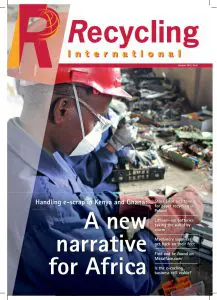47October 2015
Moreover, implementation of rules and laws as
well as the setting-up of a government-initiated
collection infrastructure proved to be ‘complex
and costly’.
Close to the source
Stora Enso did not want to wait for change. Hav-
ing been active in the Polish paper market since
the late 1990s, the company took over the
Ostroleka paper mill in 2004 from the Intercell
group. To secure raw material for the facility,
Intercell’s collection network has been expand-
ed to, at present, 21 depots spread across the
country. Every day, 100-plus trucks are on the
road and some 3000 containers are available for
transportation and stocking.
Being close to the source in practically all
regions of Poland gives Stora Enso the oppor-
tunity to satisfy almost 50% of its local needs.
The company has managed to increase its col-
lection volumes from 90 000 tonnes in 2009 to
300 000 tonnes at present. According to Gaw-
rych, this amounts to ‘15% of the total of 2.2
million tonnes’ of paper for recycling currently
being collected in Poland on an annual basis.
‘The other 85% is handled by some big com-
petitors and a large number of smaller players,’
he says.
Although most of the paper collected locally is
processed at Ostroleka and other paper mills in
Poland, some 7% or 20 000 tonnes goes to facil-
ities in Germany. Gawrych explains: ‘Obvi-
ously, our main purpose is to feed local mills.
However, given that we operate some depots in
the west of Poland, from an environmental and
logistical point of view it makes no sense to
transport the material for hundreds of kilome-
tres to the east. Instead, we cross the border to
Germany and feed mills that are closer by.’
100% recycled-based plant
In 2013, Stora Enso invested Euro 285 million
to double capacity at the Ostroleka paper facil-
ity, which is a 90-minute drive north east of the
Polish capital Warsaw.
The mill produces a wide variety of board pack-
aging products made of 100% recycled materi-
als.
The containerboard facility with its annual
capacity of more than 455 000 tonnes (total
capacity at the Ostroleka mill is estimated at 600
000 tonnes) is claimed to be ‘one of the biggest
and most advanced mills in this part of Europe’,
producing the ‘highest-quality board products
using the best technology available’ to sort out
impurities such as plastics and metals.
On a daily basis, some 100 truck-loads of paper
feed the facility, while some 1600 tonnes of
paper for recycling are handled.
Stora Enso handles 15% of
the 1.5 million tonnes of
paper for recycling collected
annually in Poland.
Michal Gawrych:
Proper paper collec-
tion from household
waste ‘completely
missing’ in Poland.




